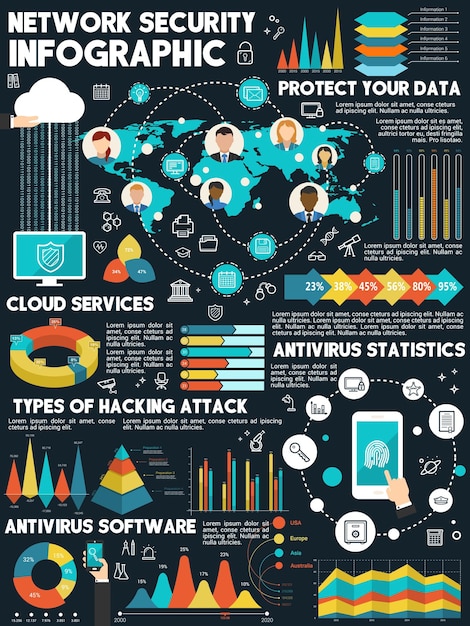Cybersecurity Careers in the US: High Demand & Opportunities

The growing demand for cybersecurity professionals in the US stems from increasing cyber threats, creating abundant career opportunities with competitive salaries and diverse specializations for skilled individuals.
The digital landscape is continually expanding, so is also the sophistication and frequency of cyberattacks. This surge has propelled an unprecedented need for skilled individuals, thus the growing demand for cybersecurity professionals: career opportunities in the US have become increasingly attractive, offering not only job security but also competitive salaries and diverse career paths.
Understanding the Cybersecurity Landscape in the US
The cybersecurity landscape in the US has become significantly complex due to an ever-increasing reliance on digital technologies. From financial institutions to healthcare providers, organizations across all sectors are struggling with protecting sensitive data and infrastructure from cyber threats.
Rising Cyber Threats
The sophistication and frequency of cyberattacks are continuously growing, making it critical for organizations to prioritize cybersecurity. Recent years have witnessed a surge in ransomware attacks, data breaches, and state-sponsored cyber espionage, significantly impacting businesses, government agencies, and individuals alike.
Regulatory Compliance and Standards
The need to comply with various regulatory frameworks such as HIPAA, GDPR, and PCI DSS has further intensified. Organizations are under pressure to implement robust security measures. For this reason, they should protect sensitive data and meet compliance requirements. Failure to do so can result in hefty fines, legal repercussions, and severe reputational damage.

Several factors contribute to the heightened demand of cybersecurity professionals:
- Digital Transformation: As businesses increasingly embrace digital technologies, their attack surface area expands, giving rise to the risks.
- Remote Work: The shift to remote work has created new security challenges, with employees using personal devices and networks. This increases the risk of breaches.
- Evolving Threats: Cybercriminals are constantly developing new and more sophisticated attack techniques, making it necessary for organizations to stay ahead of the curve.
The increasing complexity of the IT landscape, coupled with rising cyber threats and stringent regulatory requirements, has created a perfect storm. This propels the need for individuals skilled in protecting digital assets. The growing demand for cybersecurity professionals is a direct response to these challenges.
Key Cybersecurity Roles and Responsibilities
The field of cybersecurity encompasses a wide range of roles, each with its specific responsibilities and skill sets. Understanding these roles can help individuals identify to what career path aligns best according to their strengths and interests.
Security Analyst
Security analysts are responsible for monitoring networks and systems for security breaches or intrusions. They analyze security incidents, conduct vulnerability assessments, and implement security measures to protect organizations assets.
Security Engineer
Security engineers design, implement, and manage security systems and infrastructure. They work on developing security architectures, configuring firewalls, intrusion detection systems, and other security tools that ensure the confidentiality, integrity, and availability of data.
Other key roles within the cybersecurity field include:
- Chief Information Security Officer (CISO): Responsible for overseeing the entire cybersecurity strategy and operations of an organization.
- Penetration Tester: Conducts simulated attacks on systems and networks to identify vulnerabilities and weaknesses.
- Incident Responder: Responds to security incidents and breaches, working to mitigate damage and restore normal operations.
Each role involves a unique set of skills and responsibilities, they all contribute to the overall security posture of an organization. As the growing demand for cybersecurity professionals, it is imperative that aspiring professionals explore the diverse options available to find the perfect fit for their career aspirations.

Essential Skills and Qualifications
To excel in the field of cybersecurity, it’s necessary to have a diverse set of technical skills, soft skills, and relevant qualifications. These skills and qualifications enable cybersecurity professionals to effectively address the complex and evolving challenges.
Technical Expertise
It is fundamental in the domain of cybersecurity to have a strong grasp of computer networks, operating systems, and security technologies. Familiarity with security tools such as intrusion detection systems (IDS), firewalls, and vulnerability scanners is also necessary.
Analytical and Problem-Solving Skills
Cybersecurity professionals must be able to analyze complex security issues, identify root causes, and develop effective solutions. They also need strong problem-solving skills to respond to security incidents and implement preventive measures.
Additional skills and qualifications include:
- Certifications: Earning industry-recognized certifications such as CISSP, CISM, or CompTIA Security+ can demonstrate expertise and enhance career prospects.
- Education: A bachelor’s or master’s degree in computer science, cybersecurity, or a related field is often required for advanced roles.
- Communication Skills: Effective communication is crucial for conveying security risks, incidents, and recommendations to both technical and non-technical stakeholders.
Aspiring cybersecurity professionals should focus on developing these essential skills and qualifications to meet the increasing demands of the industry. Continuous learning and adaptation are key to staying relevant in the evolving field of cybersecurity. The growing demand for cybersecurity professionals means that those with the right skills and qualifications are highly sought-after.
Career Opportunities and Job Outlook
The career opportunities for cybersecurity professionals in the US are abundant, with a positive job outlook. As organizations continue to invest in cybersecurity to protect their digital assets, the demand for skilled professionals is expected to grow substantially.
Job Growth Projections
According to the Bureau of Labor Statistics, employment in computer and information technology occupations, including cybersecurity roles, is projected to grow significantly over the next decade. The increasing frequency and sophistication of cyberattacks are expected to drive the demand for cybersecurity experts.
Industries Hiring Cybersecurity Professionals
Cybersecurity professionals are needed across various industries, including finance, healthcare, technology, government, and retail. Organizations of all sizes are investing in cybersecurity to protect their data, systems, and reputation.
Here are some industries where cybersecurity experts are needed across the US:
- Finance: Banks, credit unions, and financial institutions require cybersecurity professionals to protect financial data and prevent fraud.
- Healthcare: Hospitals, clinics, and healthcare providers need cybersecurity experts to safeguard patient data and comply with HIPAA regulations.
- Government: Federal, state, and local government agencies need cybersecurity professionals to protect sensitive information and critical infrastructure.
The strong job outlook and diverse career opportunities make cybersecurity an appealing field for those seeking a stable and rewarding career. The growing demand for cybersecurity professionals creates opportunities for both entry-level and experienced professionals to advance their careers.
Salary Expectations and Benefits
Cybersecurity careers offer competitive salaries and benefits packages. Salaries vary depending on factors such as job role, experience level, education, and location. Entry-level positions typically offer a competitive starting salary, while experienced professionals can earn substantial compensation.
Salary Ranges for Different Roles
According to recent salary surveys, the median salary for security analysts ranges from $80,000 to $120,000 per year. Security engineers can earn between $100,000 and $150,000 per year, while CISOs can command salaries in excess of $200,000 per year.
Factors Influencing Salary
Several factors can influence the salary of cybersecurity professionals, including certifications, education, years of experience, and the specific roles and responsibilities of the job. Professionals with advanced degrees and industry-recognized certifications can command higher salaries.
Here are some additional employment benefits:
- Health Insurance: Many employers offer comprehensive health insurance plans, including medical, dental, and vision coverage.
- Retirement Plans: Employers often provide retirement plans such as 401(k) or pension plans to help employees save for retirement.
- Professional Development: Companies may offer opportunities for professional development, such as training programs, conferences, and certifications.
The attractive salary expectations and benefits in the cybersecurity field reflect the high demand for skilled professionals and the value organizations place on protecting their digital assets. The growing demand for cybersecurity professionals ensures that companies must pay well to attract and retain top talent.
How to Start a Cybersecurity Career
Starting a career in cybersecurity requires a strategic approach that includes education, training, and networking. Aspiring cybersecurity professionals can take several steps to enter the field and develop the necessary skills and knowledge.
Education and Training Programs
Earning a degree in computer science, cybersecurity, or a related field is a great start. Many colleges and universities offer specialized cybersecurity programs that provide students with a comprehensive understanding of security principles, technologies, and practices.
Certifications and Online Courses
Industry certifications, like CISSP, CISM, and CompTIA Security+, can enhance a professional credibility. Online courses, bootcamps, and training programs offer specialized skills and knowledge in specific areas of cybersecurity.
To improve your knowledge and skills, you might decide to:
- Networking Events: Attend industry conferences, workshops, and networking events to connect with cybersecurity professionals and learn about job opportunities.
- Internships: Seek internships or entry-level positions in cybersecurity to gain practical experience and build a professional network.
- Personal Projects: Develop personal projects, such as building a home lab or contributing to open-source security projects, to demonstrate technical skills.
The growing demand for cybersecurity professionals creates opportunities for individuals from diverse backgrounds to enter the field. By pursuing education, obtaining certifications, and gaining practical experience, anyone can start a rewarding career in cybersecurity.
| Key Aspect | Brief Description |
|---|---|
| 🛡️ Demand Surge | Increasing cyber threats driving high demand for cybersecurity pros. |
| 💼 Key Roles | Security analysts, engineers, CISOs are crucial for cyber defense. |
| 📈 Job Outlook | Strong growth projected; cybersecurity jobs are in high demand. |
| 💰 Salary | Competitive salaries and benefits attract top talent to the field. |
Frequently Asked Questions (FAQ)
▼
The rising sophistication and frequency of cyberattacks, the increasing use of digital technologies, and stringent regulatory requirements. These are some of the factors that contribute to the high demand.
▼
You will need strong technical expertise in computer networks and analytical and problem-solving skills. Also, you will need effective communication skills and the pursuit of relevant certifications.
▼
Industries like finance, healthcare, technology, and government are actively hiring security professionals. These industries are constantly trying to protect their sensitive data and infrastructures.
▼
Getting a degree in computer science or a related field is a great start. Additionally, obtaining certifications, gaining practical experience, networking, and developing personal projects will prove to be helpful.
▼
The job outlook for security professionals in the US is highly promising due to the increasing volume of cyberattacks. The Bureau of Labor Statistics is projecting significant growth in employment over the next decade.
Conclusion
In conclusion, the growing demand for cybersecurity professionals: career opportunities in the US is a reflection of the crucial need to protect digital assets in an ever-evolving threat landscape. As technology continues to advance, it’s expected to see a continuous need for people in this complex, yet vital domain.




